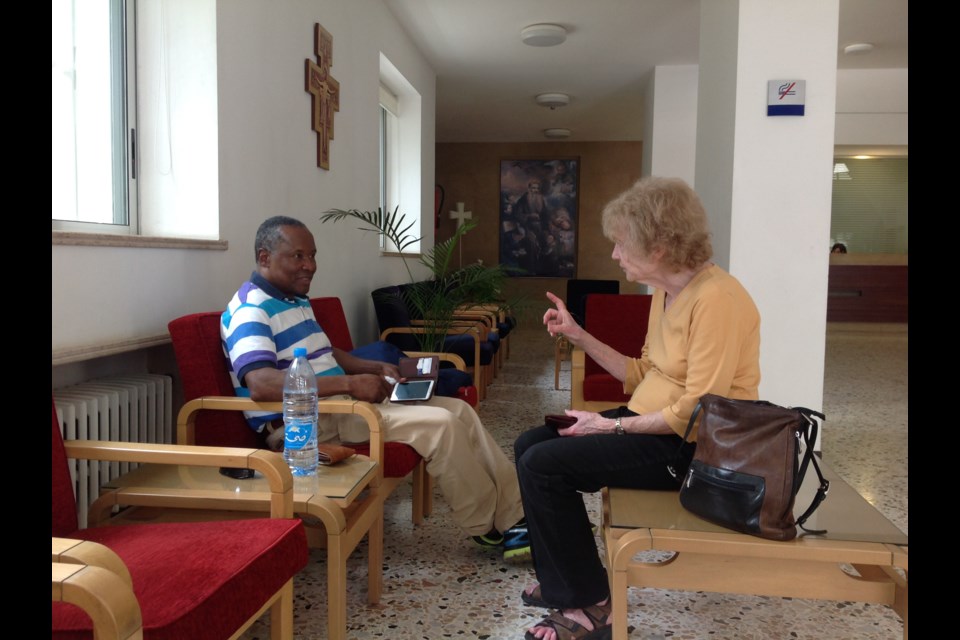GREATER SUDBURY — Former Sudbury Mayor Jim Gordon and his wife, Donna, got to see first hand recently the plight of Christians fleeing their homes in Iraq and Syria.
And some of those refugees, now living in Lebanon, may soon make their way to Canada and Sudbury.
During a high-security — and secret — trip to Beirut earlier this month, the couple met with 200 families who fled war in their homelands, and heard nightmarish stories of harassment, torture and murder. It was organized through Office for Refugees (ORAT), a group under the umbrella of the Archdiocese of Toronto.
"Donna and I are very interested in this, and we feel that, after everything we read and heard, that Christians are suffering genocide in the Middle East," Gordon said.
Security measures
The Gordons heard that ORAT was making a trip to Lebanon to interview Christian families, and they were invited along as volunteers by ORAT director Dr. Martin Mark.
The couple interviewed the families for about 25 minutes each, keeping to a tight schedule to avoid lineups outside the building where the meetings took place. Lineups of more than 10 people could draw unwanted attention, Gordon said, and create security concerns.
"We were not to tell anybody here at home that we were going to be in Lebanon or in Beirut,” he said. “It's a global village, and all it takes is one cellphone call, and the whole mission could have been jeopardized."
The families were referred by church officials; some were Maronite Christians, while others were Orthodox or Catholic. Gordon said they were looking for people who would adapt well to life in Canada. Background, skills, job experience were all part of the criteria.
Gruelling work
"You want to bring someone over who can adapt to our way of life," he said. "You'd look at the amount of education, you'd look at their skill levels, you'd look at what kind of work they had done in the past, what they were looking to do in the future, those kinds of things that tells you about the person.
"We would start at 9:20 in the morning and we wouldn't finish until 11 at night. It was gruelling."
About 150 of the families were deemed good candidates to immigrate to Canada, and Gordon said he hopes three of them will be coming to Sudbury.
“Our group is giving serious consideration to bringing these three families to Sudbury,” Gordon said. “But they wouldn't arrive for at least a year … It's going to be a long wait, but I believe it's the right thing to do.”
There was tight security for the whole trip. They stayed at a gated convent in the city, and the families were warned not to tell anyone and to show up on time for their interviews in a East Beirut apartment building to avoid a backlog outside.
'Terrible stories'
Gordon said he was struck by how much the families had suffered simply for being Christians. At best, radical groups such as ISIL would give them a few hours notice to flee their homes under threat of death. At worst, some were killed outright to spread fear.
"We heard some terrible stories," he said. "People being tortured by ISIL. People being killed — taken out of their homes and shot. People being buried alive ... Some people had to flee in the middle of the night, in their pajamas, because of what was coming."
About a million Christians have fled Iraq since the 2003 U.S. invasion, while about 500,000 Christians are among the flood of refugees who have left Syria since the vicious civil war broke out in 2011.
Despite the concrete barriers, razor wire and the presence of soldiers in the area where they stayed, Gordon said he was struck by Beirut, which was once known as the "Paris of the Middle East."
"It's a beautiful city — it's just gorgeous."
While he's heard the criticisms from some in Sudbury that we should be looking after our own citizens in need, rather than taking in refugees, Gordon said he hopes people will take a broader view.
With the world more connected than ever, what happens somewhere far away impacts everyone. The world shouldn't turn a blind eye to what's going on in a place far away, he said.
"We're no longer immune to what's going on over there," Gordon said. "We should think about that, and in any way we can, help these people.
"I know we have problems here, but you know I don't think that in life, as neighbours and humans, if we handle one problem, that doesn't mean we haven't any energy left for the next problem."
